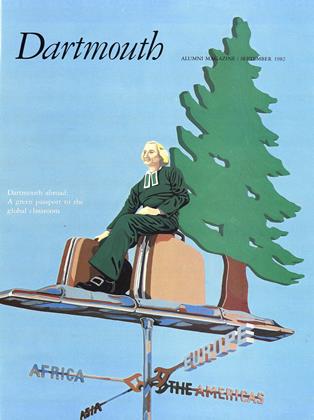W. H. Ferry '32, ed., Warming Up for Fifty Years. James R. Cook, Publisher, 1982. 215 pp. This 50th-reunion book of the class of 1932 includes essays by 25 of its members. It rigorously shuns the traditional themes: autobiography, success stories, nostalgia for those soft September sunsets, the sharp and misty mornings, the crunch of feet on snow of long-gone undergraduate years. Instead, the book is comprised by and large of serious reflections written by serious men on a multitude of serious subjects cancer therapy, nuclear war, Malthusian theory, higher education, among others which, taken together, abundantly achieve the editor's major aim: "an unbuttoning, an exposition of those feelings and observations that are quite outside traditional Reunion fare." Excerpts from the book can be found in the June ALUMNI MAGAZINE.
Robert Skutch '46, Messages from MyHigher Self. Celestial Arts, 1982. 171 pp. A collection of meditations set down by the author from 1976 through 1979 on such subjects as faith, love, dreams, joy, and inner peace. "Although it may sound strange to some," Skutch says, "the fact is that I did not really 'write' these messages ... in the traditional sense of the word." They were rather products of the process usually called "automatic" writing Skutch prefers "spontaneous" and were taken down during periods of meditation. Their major importance, Skutch believes, is that they demonstrate that "there is a deeper source of wisdom available to all ofus, one that we can call upon, no matter who we are or what our belief system may be."
John M. Richardson Jr. '60, ed., MakingIt Happen: A Positive Guide to the Future. U.S. Association for the Club of Rome, 1982. 229 pp. A self-styled "bookazine" designed to "look something like Neivsweek or Business Week in size, page format, and design" and thus to appeal to a popular audience, Making t Happen is a collection of essays by many prominent scholarfuturists, all members of the U.S. Association for the Club of Rome. The aim, writes the editor, is "to provide a systemic, encompassing view of the global transition that is already under way, giving primary emphasis to the United States as an example of an advanced, industrial society that is beginning to face up to, and cope with, global trends that almost certainly will demand fundamental change in our own practices, institutions, values, and life styles as we strive to meet the imperatives of an increasingly interdependent world." The basic assumption is "optimism about the power of the United States to lead in the world by the example we set at home."
 View Full Issue
View Full Issue
More From This Issue
-
 Feature
Feature'Far Out and Daring': Dartmouth Abroad
September 1982 By Shelby Grantham -
 Feature
FeatureFIRST IN THE EYES OF HIS COUNTRYMEN
September 1982 By David Shribman -
 Class Notes
Class Notes1957
September 1982 By Daniel M. Searby -
 Article
Article"Man Better Man"
September 1982 By Nardi Reeder Campion -
 Sports
SportsHelp Wanted: Rising Sophomores
September 1982 By Brad Hills '65 -
 Class Notes
Class Notes1977
September 1982 By Walter M. Wingate Jr., Lindsay Larrabee Greimann '77
Article
-
 Article
ArticleTHE Tucker Foundation's
DECEMBER 1958 -
 Article
ArticleHOVEY MEMORIAL EVENTS
MAY 1964 -
 Article
ArticleAbout the Artist
July/August 2001 -
 Article
ArticleAthletics
Sept/Oct 2005 -
 Article
ArticleThe Undergraduate Chair
JAN./FEB. 1980 By Beth Ann Baron '80, Michael Colacchio '80 -
 Article
ArticleFOUNDATIONS OF STUDY
AUGUST 1929 By Professor Wilbur M. Urban

